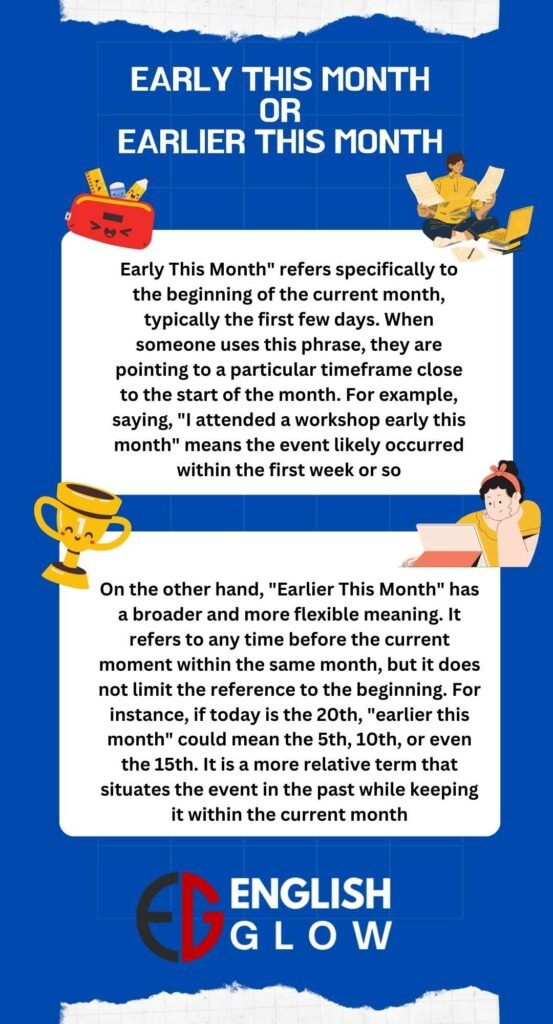In English grammar, we often come across phrases that seem interchangeable but have subtle differences in meaning. This is especially true for “early this month” and “earlier this month.” While they may look similar, each is used in different contexts. “Early this month” refers to a specific time at the beginning of this month, while “earlier this month” can compare any point in the current month to the present moment. These small differences can sometimes leave people confused, but understanding them can improve your communication and help you better express time-related events.Historically, changes in language usage, like how “early” and “earlier” are applied, have sparked much discussion. Just as Main Street was a common feature in American towns and cities in the 1900s, the usage of these terms has evolved over time. For example, I once checked Google Ngrams and noticed that certain phrases, like “late in December,” have shifted in usage over the past 100 years. The structure of adj + prep + noun has remained grammatical over time, with “late in the month” being quite common in the 1940s but later being overtaken by “in late December” around the 1950s and 1960s. Understanding how such small shifts impact language can help us navigate these phrases better.
The phrases “Early This Month” and “Earlier This Month” may appear similar but have distinct meanings and usage in communication. “Early This Month” refers specifically to the beginning of the current month, typically the first few days. When someone uses this phrase, they are pointing to a particular timeframe close to the start of the month. For example, saying, “I attended a workshop early this month” means the event likely occurred within the first week or so. This phrase is precise and sets a clear boundary for when the action or event took place, focusing on the early days of the month.
On the other hand, “Earlier This Month” has a broader and more flexible meaning. It refers to any time before the current moment within the same month, but it does not limit the reference to the beginning. For instance, if today is the 20th, “earlier this month” could mean the 5th, 10th, or even the 15th. It is a more relative term that situates the event in the past while keeping it within the current month. This makes it suitable for discussing events without pinpointing them to the very start. Both phrases provide useful ways to describe timing, but their nuances lie in the specificity of “early” versus the relativity of “earlier.”
What Does “Early This Month” Mean?
The phrase early this month is used to describe events that took place at the beginning of the current month. Typically, this refers to the first week or the initial ten days, providing a specific time reference that helps establish a clear time frame. For example, when you say, “The report was submitted early this month,” it means the submission happened within the initial days of the month. This gives the listener or reader a concrete sense of time, making the timing easy to understand.
You should use early this month when you need to specify that something occurred in the first part of the month. It’s especially important when precise timing matters to the context of the discussion. For instance, if an event is being described and it happened in the first few days of the month, this phrase ensures the timing is clearly understood. It’s a useful expression in both casual conversations and professional contexts, where accuracy is key.
The phrase earlier this month is quite flexible and refers to any time in the current month that has already passed. It doesn’t specifically restrict the time to the beginning of the month; instead, it indicates that an event occurred before the present moment but within the same month. For example, if you say, “We had a meeting earlier this month to discuss the project’s progress,” it implies that the meeting happened at some prior point in the month. This usage does not specify whether it was in the first few days or the mid-month.
Example
For instance, you might hear someone say, “I finished my report earlier this month, and I submitted it last week.” This statement helps clarify that the report was completed sometime before the current week, but it does not pinpoint the exact day it was finished. Understanding how to use earlier this month correctly can improve your communication and help you express time-related events more clearly.
Imagine you are catching up with a friend, and you might say, “Remember that concert we talked about? I went to it earlier this month, and it was amazing!” In this case, using earlier this month indicates that the concert took place at some point during the current month, but it doesn’t specify the exact date. This phrasing keeps the conversation casual while providing enough context for your friend to understand that the event
happened recently, without locking it into a specific timeframe. Understanding this phrase allows for clearer communication about past events while maintaining a friendly tone.
you might enjoy reading: Resetted or Reset? Discover the Best Option for You!
When to Use Earlier This Month
You should use earlier this month when referring to an event that has already happened. This phrase is helpful because it allows you to communicate that something took place without needing to specify if it was at the start of the month. The exact time frame isn’t as crucial, and the focus is on the fact that the event occurred at some point in the current month. For example, if you say, “I completed my report earlier this month,” it implies the report was finished, but it doesn’t tell the listener exactly when.
This phrase is ideal for situations where precision in timing isn’t necessary, making it more versatile in various contexts. You might hear someone say, “We had a meeting earlier this month to discuss our goals.” In this case, it simply indicates that the meeting happened sometime before now, without locking it into a specific date. Using earlier this month helps keep your communication clear and effective.
Key Differences Between “Early This Month” and Earlier This Month
Specificity in Timeframe
The phrases early this month and earlier this month have important differences in their meanings. Early this month is specific and is always used to refer to things that happened in the first part of the month, typically within the first week or even the first 10 days. For example, if it’s April 28, you could say, “I went to the doctor early this month.” This indicates that the visit occurred at the beginning of April. In contrast, earlier this month is more flexible. It refers to any time in the current month that has already passed
Example
For instance, if you say, “I visited my friend earlier this month on April 18,” it means the visit happened before now, but it doesn’t specify if it was at the start or the middle of the month. The specificity in timeframe for early this month makes it clear that you are talking about the first part of the month. On the other hand, earlier this month can be used to describe any event that took place before the current date. Knowing these differences can help you communicate more effectively in various situations.
If you say, “I completed my project early this month,” it suggests that you finished the project in the first few days of the month, perhaps by April 5. This gives a clear idea of when the project was completed.
Conversely, if you mention, “I submitted my project earlier this month on April 15,” it indicates that you submitted it at some point before the current date, but it does not specify if that was at the beginning or later in the month. The phrase allows for a broader interpretation of timing. Understanding how to use these phrases properly will help you convey your message with clarity.
you might enjoy reading: Is It Correct to Say ‘Have a Good Night’? Discover the Surprising Truth!
Flexibility in Use
The phrase earlier this month offers more flexibility compared to early this month. While early this month limits the time to the early days of the month, such as the first week or ten days, earlier this month can refer to any point before the current date within the current month. This means that if something happened on April 15, you can say, “I completed the task earlier this month,” and it clearly indicates that the task was done before now, but it doesn’t specify when exactly.
In contrast, if you say, “I finished my project early this month,” it implies that the project was completed in the first part of the month, perhaps around April 2 or 3. Understanding these differences allows you to use each phrase effectively in conversations. Whether you need to specify an event that happened recently or want to keep the timing vague, knowing when to use each phrase can enhance your communication skills.
Precision in Communication
When discussing events, using early this month is essential when precision is important. This phrase clearly signals that an event occurred during the early days of the month, making it easy for the listener or reader to understand the specific timeframe. For example, if you say, “I submitted my assignment early this month,” it indicates that you completed the task in the first part of the month, such as the first week. This clarity helps avoid confusion in conversations about timelines.
On the other hand, earlier this month can be used when the exact date is not as critical, but you still want to refer to something that happened before the current date. For instance, if you mention, “I visited my friend earlier this month,” it implies that the visit occurred sometime during the month, but it does not specify when. Using these phrases correctly enhances your communication skills, allowing you to convey information clearly and accurately.
Why It’s Important to Know the Difference
Knowing the difference between these two phrases can greatly improve your communication skills. This is especially important in professional settings, where misunderstandings about timeframes can lead to confusion, missed deadlines, and
unclear expectations. For instance, using the correct phrase ensures that your message is precise and effective, whether you’re writing an email, report, or engaging in casual conversation.
When discussing events, the phrase early this month clearly refers to things that happened in the first part of the month. For example, if it’s April 28 and you say, “I visited the doctor early this month,” it indicates that your visit occurred in the first days of April. However, if you use earlier this month, it allows for more flexibility, meaning the event happened any time before now in the same month, such as on April 15. Understanding these distinctions helps you convey information accurately.
While reading various texts, I noticed that many people interchange early and earlier without realizing the impact on their message. For example, if someone says, “I completed my report earlier this month,” it suggests the report was finished before now but doesn’t specify if it was at the beginning of the month. On the other hand, saying, “I completed my report early this month,” clearly indicates it was done in the first part of the month. Recognizing the proper usage of these phrases allows you to communicate more effectively and avoid common pitfalls.
Conclusion
Though early this month and earlier this month may seem similar, the distinction in their meanings is crucial for effective communication. Early this month refers specifically to the beginning of the month, while earlier this month is more general and can encompass any time before the current date in the month. Understanding these differences is essential for clear communication, whether you’re writing emails, reports, or engaging in casual conversations.
Mastering these nuances will enhance your grammar and improve the clarity of your writing.
Example
Using earlier this month allows you to indicate that an event occurred at any time before now, while early this month pinpoints that the event happened in the first days of the month. Knowing when to use each phrase can make your communication more precise and effective.
By understanding and applying these grammatical differences, you ensure that your communication remains clear, accurate, and professional. This attention to detail not only helps you convey your message effectively but also demonstrates your mastery of language, making you a more confident communicator in both personal and professional settings.
Is it “early this month” or “earlier this month”?
Both can be correct depending on the context. “Early this month” refers to the beginning of the month, while “earlier this month” means sometime before today, but within the current month.
What does “earlier this month” mean?
“Earlier this month” refers to something that happened at a previous point in the current month, but not necessarily at the very beginning.
Why does my period come earlier and earlier each month?
There are several reasons why menstrual cycles may become shorter or irregular, such as stress, hormonal changes, or health conditions. It’s best to consult a healthcare professional for a detailed explanation based on your specific situation.
When should I use “early” and “earlier”?
Use “early” to describe something happening at the beginning of a time period, such as “early in the morning” or “early in the month.” Use “earlier” to compare times, meaning before now, e.g., “I arrived earlier than expected.”
What is the difference between “earlier” and “earliest”?
“Earlier” is used to compare two times, indicating one is before the other. “Earliest” is the superlative form, meaning the very first or the soonest possible time. For example: “I arrived earlier than John” vs. “I arrived at the earliest time possible.”
What is a synonym for “earlier this month”?
Some synonyms include “previously this month,” “at the start of this month,” or “a few days ago in this month.” These phrases express the idea of something happening before today, within the current month.





